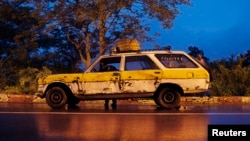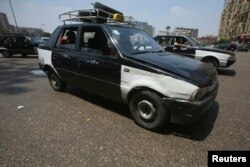African and South Asian nations could miss national targets to curb greenhouse gas emissions unless rich countries stop using them as dumping grounds for millions of polluting old cars, a study has warned.
The report by the Center for Science and Environment (CSE) said the United States, Japan and European Union countries had for years been exporting old, used cars — or clunkers — to nations such as Nigeria and Bangladesh.
The secondhand vehicles, which should have been scrapped under domestic regulations, are instead being used by poorer nations where they are contributing to carbon emissions, said CSE, a New Delhi think tank.
Weak environmental regulations in poorer economies and stronger emissions regulations in exporting countries are among the factors "inciting this unregulated global trade in clunkers," Anumita Roychowdhury of CSE said this week.
"If this continues unchecked, without the exporting countries sharing the responsibility of addressing this problem, the poorer countries will not be able to meet their clean air and climate mitigation goals," she said during a news conference on Facebook Live.
There are about 2 billion vehicles globally, of which 2 percent, or 40 million, are deemed unworthy for road use in developed nations annually, according to the report.
Many of them end up in countries such as Kenya, Nigeria and Ethiopia. Ninety percent of Nigeria's 3.5 million cars are imported secondhand vehicles, according to data from the management consultancy firm Deloitte.
Growing source of pollution
These old, poorly maintained and often malfunctioning vehicles become energy guzzlers and emit high levels of heat-trapping gases, CSE said.
Even though the level of emissions in less developed nations is lower than the world average, clunkers are a rapidly rising source of pollution, added the report. If left uncontrolled, clunkers could jeopardize climate goals set by poorer nations on reducing greenhouse gas emissions as part of an international pact to slow down global warming.
The cars are also contributing to high levels of air pollution in cities like Dhaka and Lagos, increasing the risk of lung diseases, respiratory illnesses and cancer, it added.
Car manufacturers should be responsible for taking back the vehicles, recycling or disposing of them, while authorities in higher-income countries should put in place export regulations.
Strong exit rules are needed to verify, inspect, certify and codify vehicles before export, and all vehicles with compromised emissions and safety features need to be barred from export, the study said.
Many lower-income nations are taking steps to control the sector — from reducing their dependency on used-car imports by promoting their own automobile manufacturing sector to raising import duties on big, fuel-guzzling vehicles.
But experts from the U.N. Environment Program (UNEP) said many lower-income countries still lack a comprehensive set of policies to keep a check on imported clunkers.
"Our observation is that countries that lack policies and incentives to attract cleaner vehicles are importing inefficient vehicles that emit greenhouse gases above the global averages," said Jane Akumu from UNEP's Air Quality and Mobility Unit.






